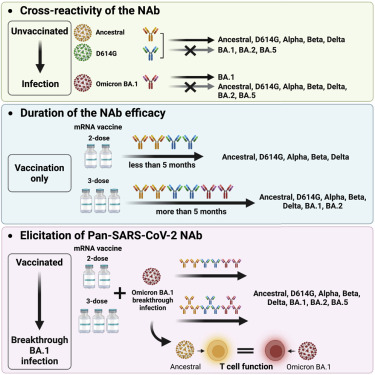- [CELL REPORTS MEDICINE] Enhanced antibody responses in fully vaccinated individuals against pan-SARS-CoV-2 variants following Om
- 관리자 |
- 2024-07-03 15:36:31|
- 179
- 2024-07-03 15:36:31|
[Title]
Enhanced antibody responses in fully vaccinated individuals against pan-SARS-CoV-2 variants following Omicron breakthrough infection
[Author]
, , , , , Eun-Ha Kim 1, , , , , , , , , , , , , , , , , , , , ,
[Journal]
Cell Reports Medicine, Volume 3, Issue 10, 18 October 2022, 100764
[Abstract]
Omicron has become the globally dominant severe acute respiratory syndrome coronavirus 2 (SARS-CoV-2) variant, creating additional challenges due to its ability to evade neutralization. Here, we report that neutralizing antibodies against Omicron variants are undetected following COVID-19 infection with ancestral or past SARS-CoV-2 variant viruses or after two-dose mRNA vaccination. Compared with two-dose vaccination, a three-dose vaccination course induces broad neutralizing antibody responses with improved durability against different SARS-CoV-2 variants, although neutralizing antibody titers against Omicron remain low. Intriguingly, among individuals with three-dose vaccination, Omicron breakthrough infection substantially augments serum neutralizing activity against a broad spectrum of SARS-CoV-2 variants, including Omicron variants BA.1, BA.2, and BA.5. Additionally, after Omicron breakthrough infection, memory T cells respond to the spike proteins of both ancestral and Omicron SARS-CoV-2 by producing cytokines with polyfunctionality. These results suggest that Omicron breakthrough infection following three-dose mRNA vaccination induces pan-SARS-CoV-2 immunity that may protect against emerging SARS-CoV-2 variants of concern.

Enhanced antibody responses in fully vaccinated individuals against pan-SARS-CoV-2 variants following Omicron breakthrough infection
[Author]
, , , , , Eun-Ha Kim 1, , , , , , , , , , , , , , , , , , , , ,
- 1 College of Medicine and Medical Research Institute, Chungbuk National University, Cheongju 28644, Republic of Korea
- 2 Department of Internal Medicine, Chungbuk National University Hospital, Cheongju 28644, Republic of Korea
- 3 Center for Study of Emerging and Re-emerging Viruses, Korea Virus Research Institute, Institute for Basic Science (IBS), Daejeon 34126, Republic of Korea
- 4 The Center for Viral Immunology, Korea Virus Research Institute, Institute for Basic Science (IBS), Daejeon 34126, Republic of Korea
- 5 Division of Infectious Diseases, Department of Internal Medicine, Korea University College of Medicine, Seoul 08308, Republic of Korea
- 6 Public Health Research Institute, National Medical Center, Seoul 04564, Republic of Korea
- 7 Division of Infectious Diseases, Department of Internal Medicine, National Medical Center, Seoul 04564, Republic of Korea
- 8 Graduate School of Medical Science and Engineering, Korea Advanced Institute of Science and Technology (KAIST), Daejeon 34141, Republic of Korea
- 9 Department of Internal Medicine, Severance Hospital, Yonsei University College of Medicine, Seoul 03722, Republic of Korea
- 10Division of Infectious Diseases, Department of Internal Medicine, Seoul National University Bundang Hospital, Seoul National University College of Medicine, Seongnam 13620, Republic of Korea
- 11 Chungbuk Regional Cancer Center, Chungbuk National University Hospital, Cheongju 28644, Republic of Korea
[Journal]
Cell Reports Medicine, Volume 3, Issue 10, 18 October 2022, 100764
[Abstract]
Omicron has become the globally dominant severe acute respiratory syndrome coronavirus 2 (SARS-CoV-2) variant, creating additional challenges due to its ability to evade neutralization. Here, we report that neutralizing antibodies against Omicron variants are undetected following COVID-19 infection with ancestral or past SARS-CoV-2 variant viruses or after two-dose mRNA vaccination. Compared with two-dose vaccination, a three-dose vaccination course induces broad neutralizing antibody responses with improved durability against different SARS-CoV-2 variants, although neutralizing antibody titers against Omicron remain low. Intriguingly, among individuals with three-dose vaccination, Omicron breakthrough infection substantially augments serum neutralizing activity against a broad spectrum of SARS-CoV-2 variants, including Omicron variants BA.1, BA.2, and BA.5. Additionally, after Omicron breakthrough infection, memory T cells respond to the spike proteins of both ancestral and Omicron SARS-CoV-2 by producing cytokines with polyfunctionality. These results suggest that Omicron breakthrough infection following three-dose mRNA vaccination induces pan-SARS-CoV-2 immunity that may protect against emerging SARS-CoV-2 variants of concern.





